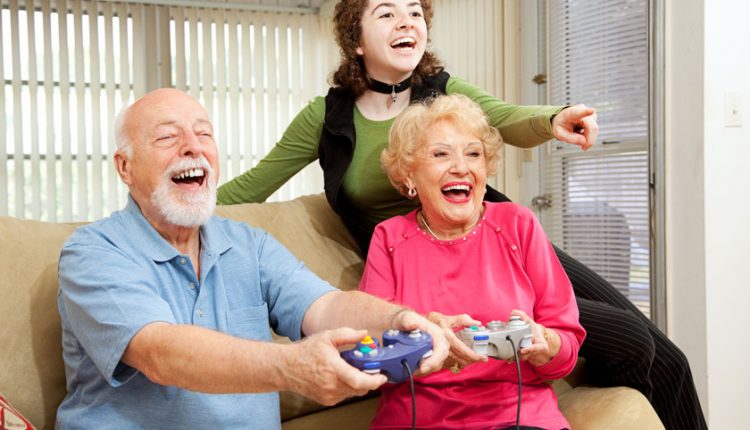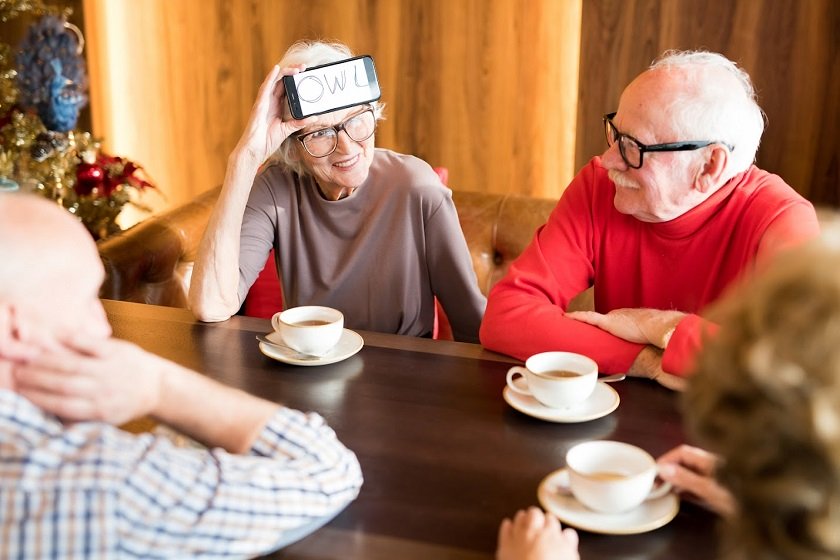
Can You Combat Depression by Playing Fun Games?
The connection between playing games and mental health has always been under the shadows of many myths.
Psychologist Brian Sutton-Smith found that the opposite of playing isn’t working, but depression. The truth is that playing games have considerable benefits, including improving complex problem-solving abilities and boosting social interaction.
Also, playing (video) games can be a fantastic way to challenge your brain, enhance your mental health, and combat depression.
When people play, they are more confident, energetic, and emotionally positive. People who are depressed lack physical energy, struggle to complete day-to-day tasks and are generally negative.
Fortunately, Sutton-Smith’s findings are compatible with other scientific studies: playing games provide neurological benefits. Let’s have a look into the effects of gaming on your brain.

Contents
- 1 The Brain of a Player Vs. The Brain of Someone with Depression
- 2 When a person plays a game, they’re constantly stimulating two parts of their brain. The first is the reward pathways, parts of the brain that process motivation and goals. The second part is called Hippocampus, the brain’s region that helps us remember events and learn new things.
- 3 Benefits of Playing Games: In What Ways Can Games Help Combat Depression?
- 4 Get to Know This Video Game: One of the Games to Overcome Depression.
- 5 Tips On Making The Most Of Your Games
- 6 Enjoy the Benefits But Beware the Dangers
- 7 Final Words
The Brain of a Player Vs. The Brain of Someone with Depression
When a person plays a game, they’re constantly stimulating two parts of their brain. The first is the reward pathways, parts of the brain that process motivation and goals. The second part is called Hippocampus, the brain’s region that helps us remember events and learn new things.
Those who have played video games before may find it obvious. When you play, you concentrate on a specific goal and are motivated to take the necessary steps to reach that goal, whether it is to solve puzzles, fight bad guys, or seek hidden treasure.
The reward pathways in the brain become more active as you progress closer to achieving your objective. When a person is depressed, these two parts of the brain downsize.
Playing games can help keep those brain parts active and healthy.
Now, let’s review the benefits of games.
Benefits of Playing Games: In What Ways Can Games Help Combat Depression?
Playing games has numerous mental health benefits, according to WebMD. Combatting depression might get a little bit easier when you take advantage of these benefits. Here are a few in case you are curious:
Mental Stimulation
Most games are thought-provoking. When you play games, nearly every part of your brain works to help you think at a higher level. Depending on the game’s difficulty, you may need to consider, develop a strategy, and analyze the situation quickly.
Playing games engages deeper parts of the brain, improving adaptation and critical thinking abilities.
Sense of Accomplishment
There’s no surprise that you must complete specific objectives in the games. The sense of accomplishment after achieving these objectives can help improve your overall well-being.
You get a greater sense of accomplishment when you play games that award you with trophies or badges for completing specific tasks. Trying to earn more achievements gives you a goal to strive more.
Social Interaction
Online and in-person games are excellent for socialization. In fast-paced game settings, you’ll learn who to trust and who to leave behind. Also, multiplayer games promote collaboration. It’s also a low-risk environment where you can practice talking to and building friendships with new people.
Emotional Resistance Toward Failures
It can be upsetting to lose in games or other situations. As a result of playing games, people learn to deal with failure and keep going. As people age, it becomes an essential tool to understand and use.
Contrary to popular belief, playing games improves your mood and has long-term effects. Generally speaking, playing games is the best way to spend time with your friends or to relieve stress.
Get to Know This Video Game: One of the Games to Overcome Depression.
There’s a Video Game Specifically Designed To Assist People in Overcoming Depression.
While most video games can improve brain function and mood, SPARX was created to overcome depression. Although the player is unaware of it, the fantasy game contains elements of cognitive behavioural therapy.
Players in the game create their avatar and then try to destroy GNATs, which stand for “gloomy, negative, automatic thoughts.” By killing these creatures, players learn that these thoughts aren’t necessary to live with and are destructible.
In their study, the game’s creators from New Zealand discovered impressive results. Approximately 44 percent of SPARX players recovered from depression, while other patients received standard treatments.
Additionally, compared to 58% of patients receiving treatment, 66% of the gaming group experienced a 30% or more significant reduction in symptoms.
Tips On Making The Most Of Your Games
Here are some tips on how to get the most out of games to fight depression and improve mental health in general:
- Choose a game you enjoy playing because it will increase the likelihood of sticking with it. For instance, if you hate word games, you don’t need to force yourself to play them.
- Pick various games to play alone and with others, either online or in-person, to expand your social circle.
- Look for games with different difficulty levels so you can begin on a low level and progress to a higher level as you progress.
- Finally, remember that many games have both online and “app” versions that you can play on your pc or smartphone. With all the choices you have today, your options are virtually unlimited.
Enjoy the Benefits But Beware the Dangers
Spending too much time playing video games stops them from benefitting you. Playing more than 10 hours a week is considered “excessive.”
In such cases, you may:
- Have apprehensive thoughts
- Inability to sleep
- Desire to avoid social settings
Another concerning sign is the use of video games to avoid reality. This type of behaviour, as previously stated, can lead to video game addiction, leading to other harmful effects.
Like everything else, too much gaming can be harmful, but it can benefit your mental health when done in moderation.
Final Words
Playing games to overcome depression is tricky because it can impact everything from daily functioning to sexual function, not to mention self-harm and suicidal thinking. When treatment options feel burdensome, threatening, or stressful, the individual is less likely to seek help.
Still, whether regular or specifically designed to alleviate depression symptoms, games may help some people feel better and engage in life more meaningfully. It could be an effective antidepressant.
What do you think about the effects of playing games to combat depression? What are some of your favourite games that have helped you through hard times? Let us know in the comments.


During my depression, there was no way I could tolerate family or relationships. However, what saved me from this situation was nothing but a new addiction, playing games! It may sound silly, but it cheered me up and gradually improved my relationship with my family. Back then, All I wanted was to have a family gathering and play a fun board game. Over time, I realized something had changed about me. I was much happier. So, if it does not fully relieve depression, it does provide some relief, and I have a suggestion for everyone reading this comment: Don’t underestimate the power of fun games!
Well, I have my own history on this…..to anyone who is reading this and linking video games with depression, let me assure you, depressed people play video games because they are depressed; they’re not depressed because they play video games. And most of the time, they can be a lifeline to people who are struggling to find joy in their life! But not spending enough time outdoors and not exercising can exacerbate depression. Just don’t play games so much that it would interfere with your daily life. Sometimes you even end up with nasty headaches! Moderation is the key.
I believe Role-playing games to be the best while dealing with depression. I don’t recommend competitive games, though. Try card games if you insist on competitive stuff. They’re more depressed-friendly, I guess. Role playing games have this way of making you feel special and playful. Cause in the game, you’re the only one able to save the town/world/galaxy etc. In role playing games, you’re the main event; you’re the special one. That’s the reason why these games are so goddamn successful. Anyway, my advice to you is never to give up on games. Keep learning and keep developing your reflexes.
Interesting!! That’s something I’ve never considered. Which role-playing video games are your favourite and worth a try?
Well, finally, a post I can leave a useful comment under. I have depression, and it used to be to the point of 3 hospitalizations in 2 year span. I had plans to end things. My father’s passing literally changed my life and personality… It’s gotten better now. But depending on just video games to “get through” depression is not the way. Particularly if you are struggling with constant suicidal thoughts, just one thing, one method, will do nothing for you. My advice is to seek out professional help, therapy and medication. They make a world of difference.
I never suffered from depression. At least, this is how everyone around me sees me. Nevertheless, I remember the endless ocean of depression my sister was drowning in. I remember that she spent a lot of time playing video games. Playing these games gave her a strange sense of relief. It was as if the games provided her with an opportunity to relieve repressed sadness and aggression. As a result, I would say yes. In the process of healing, video games, specifically fun games, can be a great help.